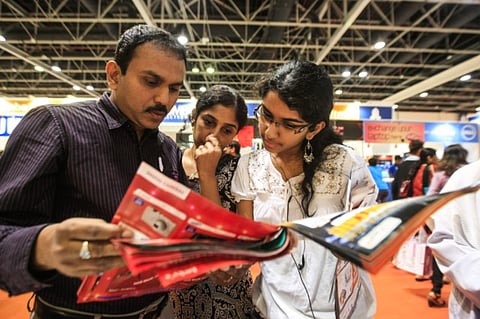Mobility is reshaping consumers’ spending behaviour
Networking capabilities and entertainment adding fuel to demand

Dubai: Mobility is reshaping the spending behaviour of customers faster than it was as few years ago.
The growth of portable technology is exponential, making it the highlight in the consumer electronics arena. At the fast pace that the market is growing, a strong hike in sales is expected in the near future.
“The availability of electronic gadgets has exploded over the years, improving the technology at every level. These days, gadgets are used for every facet of life, from entertainment to education, and from work to play. Thus, every household not only has one device but every member of the family owns a device. Technology was a trend, but has now become a need,” Neelesh Bhatnagar, CEO of Emax, told Gulf News.
He said that technology products are now cheaper; this enables more people to experiment with them. It is also the pre-launch marketing by the brands that further instigate the interest amongst the general public.
Affordability along with shorter cycle of launches with better technology has resulted in more customers experimenting with a wider range of products.
TVs and desktop computers are usually upgraded every three to four years, but tablets, smartphones and ebook readers in the UAE are often replaced every 12 to 18 months. Game console manufacturers typically work on a four- to five-year cycle.
Consumer spending is increasing rapidly, with more and more disposable income available. According to a recently published report by Gartner, worldwide devices spending are forecasted to reach $718 billion in 2013, up 7.9 per cent from 2012.
“Consumers are definitely more aware of conveniences in technology. Smartphones and tablets are popular and convenient devices. Consumers tend to leave the home laptop in the bag and are abandoning the home office in favour of the couch or bedroom to do online activities in a more comfortable environment using a tablet or smartphone,” Nadeem Khanzadah, Head of Retail at Jumbo Electronics, said. There is more functionality that gets combined into one device thus reducing the need to have as many devices on your personally. For example, the simple alarm clock is now history in most households as the smartphone or mobile phone has replaced the need to have an alarm clock for most people. The same goes with calculators, typewriters, photo albums, pagers or even the trusted landline telephone at home.
“What we have seen in the UAE is that virtually in every household at least one if not more laptops per family. In most cases, this laptop isn’t the first laptop that has been purchased by the family which means that the buyer of laptops has become more sophisticated,” Panjabi said.
Internet penetration
With the internet penetration rates within these types of households being as high as it is, there is a WiFI environment running within these households and a lot of these households have started purchasing tablets.
Smartphone penetration is ahead of tablet penetration and virtually in every household this rate is creeping up to close to a 100 per cent penetration rate.
This early adopter trend is becoming mainstream consumer behaviour. Consequently, technology and service providers are faced with “no alternative but to innovate for mobility. If they do nothing, they face a potential train wreck as consumers abandon gadgets, services and applications that do not fully support changing mobile lifestyles.” Khanzadah said.
“The gap between being an early adopter and a mainstream consumer is reducing. I wouldn’t call everyone an early adopter but when you see sales trends of a lot of products these days, the time it takes for a brand to reach ten million units in sales is now becoming a matter of months or weeks, not years anymore,” Panjabi said.
The goal in any consumer driven activity is to be “where your consumer is,” he said.



